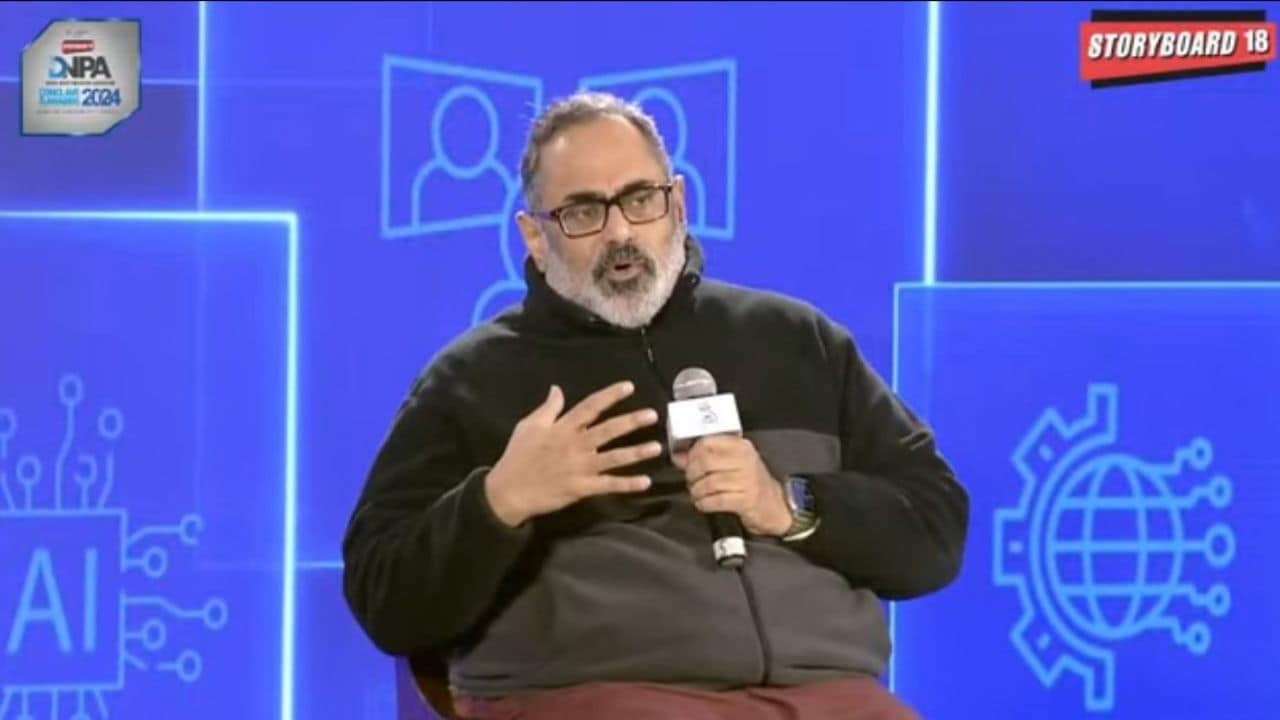The Narendra Modi government will be prioritising ad tech policies and regulations to cater to the longstanding demands of the digital news publishers who have been suffering revenue losses to big techs.
At the Storyboard18 DNPA Conclave and Awards 2024, Rajeev Chandrasekhar, Minister of State for Electronics and Information Technology in the Government of India, assured that the government aims to address the revenue share issue and rectify it on priority.
“We are concerned about the deep asymmetry between the content creators and those who can help them to monetise it. From a policymaking point of view, we want the internet to be open and we certainly do not want monetisation on the internet to be in the purview or to be controlled by just one or two or three companies,” the minister said.
“We are very clear that we don’t want monopolies and duopolies in the space,” the minister said.
“We are certainly not of the opinion that our internet with 120 crore Indians that are going to be consuming it by 2025 should be catered to by the big islands on the internet be on e-commerce or search or social media or ad tech. That is the basic principle that guides our approach to this issue as a government,” Chandrasekhar said.
The minister highlighted how the pre consultation draft of the Digital India Act laid the foundation of solving the visible asymmetries between the digital publishers and the big tech companies.
“The big tech platforms are gatekeepers to monetising content and that asymmetry needs to be legislated, or at least regulated through rules of a new legislation. And I’m hopeful that after Narendra Modi ji resumes office this year, this will be his priority,” Chandrasekhar added.
OTT content regulations
Moving on from revenue share and news publishers, the minister also addressed stakeholder concerns on OTT regulations.
He pointed out that those who consider the IT Rules arbitrary or far reaching have not analysed the rules well.
According to him the IT Rules prohibit and control the content that not only violates the IT Rules but also the Indian Penal Code.
“If you read the rules, you will find that the rules are absolutely clear, simple and consistent guardrails to protect the consumer. What we laid down are 11 types of unlawful content that should not be on any platform because they are not just unlawful as per the IT act but also unlawful under the Criminal Code. For example, CSAM (Child Sexual Abuse Material). Nobody can argue that prohibiting child sexual abuse material on any platform or the internet is far reaching,” he said.
“Just because you are on the internet doesn’t mean the laws of the land will not touch you,” the minister added.
Regulating AI
According to Chandrasekhar, the Indian government is actively addressing the obstacles and challenges of AI, alongside recognising its benefits.
“I don’t believe we should fear technology. It’s like fearing what is inevitable. AI stands as the greatest invention in our lifetime. Our focus should be on not resisting this change but on fully harnessing it,” he said.
“When it comes to AI, the progress in the last few years has been immense. It’s inevitable that AI will profoundly shape, change, and transform our lives, redefining what we consider normal,” he added.
According to him the focus should not be on resisting the change that AI has brought to the ecosystem but harnessing it intelligently.
“We need to create guardrails and instil accountability on platforms offering AI solutions, ensuring the safety and trust of these platforms. Whether you’re a big tech company from the US or elsewhere, a company in India, or a small or large entity, what you provide to our consumers must be safe and reliable. The internet cannot be a testing ground. What the consumers consume have to be tested and deemed safe on priority before going live,” he added.
The government according to Chandrasekhar is trusted with the duty of protecting citizens’ fundamental rights and thus is imperative to have rules.
“We have to have legislative guardrails that ensure platforms are accountable for what they are putting out for people to use. It is a shared goal for anybody who wants the Internet to be robust, healthy and profitable and rather than being a toxic place,” the minister said.
